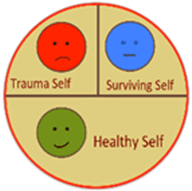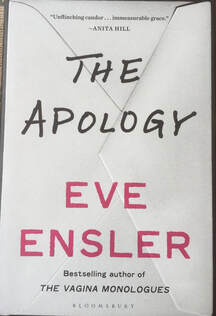|
I have become aware of how often I refer to ‘parts’ of our selves when working with coaches in supervision and with clients and how it is always met with ‘that is so helpful’. I thought I would share this approach and my thinking more widely. Examples include:
The first statements imply the experience is all encompassing and suggests an identification with the feeling or narrative. Such identifications come from the survival self. It is not true that ‘all of us’ is caught up in this experience, we have access to other resources which can reflect on and engage with the context we are responding to. In trauma the ‘psyche’ splits, creating the survival and traumatised selves. The healthy self continues but access to it has been diminished by the trauma (see previous postings). This figure (© Franz Ruppert), illustrates that split. Due to the fragmentation that occurs with trauma, within each of the survival and trauma selves there are different ‘parts’, different expressions of the survival self and strategies, or the trauma self. Each ‘part’ carries memories, beliefs and feelings which connect to the ‘there and then’. By talking of ‘part of you/me’ we recognise that this part exists, and leaves the possibility open of other parts emerging from the healthy self as resources to be accessed. The healthy parts are more consistent as they are unaffected by the trauma, other than being repressed by the survival self. From that self we know what is healthy for us, can think clearly about what is our business and what is the business of others, and what action is in our best interests. In coaching, we want to encourage the healthy parts to have a voice, to challenge the survival part narrative.
Whenever you hear yourself make statements which sound all encompassing, change your language to ‘part of me feels’. Encourage those you supervise or coach to experiment with that as well. It is a simple way of reframing and recognising the splits in the psyche. It is important also to welcome all parts, while we are reframing to ‘part of you feels overwhelmed’ we need to make it clear that that part is welcome, it is not being rejected. This is because many people dislike or want to reject the parts that are present, particularly those from the trauma self, but also those from the survival self. All parts are important in terms of understanding the internal system. We can ask the client to say more about a part, and explore what other parts are also present. A client the other day arrived saying “part of me is fine, the other part of me is wobbly”, my response was both parts are welcome. That allows both to be present. In his book Internal Family Systems Therapy, Richard Schwartz takes this to a further stage by identifying and naming parts as sub-personalities within the internal psyche-system of the individual. He talks of trauma causing the self-system to break down, with parts of the self becoming polarised and at war with each other. I read this as being similar to Franz Ruppert’s approach with the splits in the psyche and the fragmented selves. Schwartz identifies three categories – Exiles, Managers and Firefighters. Within Ruppert’s model, Exiles are trauma parts, with Managers and Firefighters being survival parts. Schwartz also talks of the undamaged essence-self, in Ruppert’s terms the healthy self, that is confident and can emerge to lead the healing process. He refers to this as self-leadership. The parts that emerge, he states, may not be aware of other parts of the system, hence the naming of them and allowing for other parts to emerge. While he is writing for therapists, if coaches are interested, there is much that can be transferred appropriately and usefully within coaching practice. Julia Vaughan Smith
0 Comments
“I was rather taken aback, the client talked a lot about her current relationship difficulties and seemed to want to focus on that, is that coaching? It felt more like counselling”.
The implied question seems to be that if this is the content, is that still coaching? For me, the answer is yes. I also heard some concern in her voice about what to do with this material, how to receive it and respond. This illustrates one of those experiences that we have all had in our coaching lives, when something happens which leaves us feeling unprepared, and which is a rich opportunity for learning. Clients may choose to share deeply personal information with us within the safety of the confidential space. We need to receive it and stay listening as they talk. It is what we do with the material, that makes it coaching, counselling or therapy; together with the extent to which the contract involves exploring feelings and inner experience. A coaching response would be to acknowledge the feelings, and then make an intervention that is aimed at the client’s healthy resources and implies moving towards action. For example, with questions similar to ‘what would be helpful for you here about this issue?’ or ‘ what would be a good outcome for you?’ . It may be that clients need some space to decide what action they want to take, perhaps to find a counsellor to explore the issue in a different way. If the contract is about work-based coaching, supporting clients to decide what action to take, can be beneficial to their work and thus to their employers and colleagues. Many relationship difficulties arise from entanglements resulting from insecure attachment and the trauma of love in early years. While understanding these dynamics wouldn’t change an effective coaching response it does prevent and ineffective or inappropriate one. I am aware that some coaches are concerned about learning about trauma in case that takes them into territories for which they feel unprepared and untrained. Such cautions are important in practice. However, my experience is that understanding trauma means that you are less likely to get into territory for which you feel unprepared. If we understand trauma, we are better able to recognise survival behaviour, thoughts and feelings, and are less likely to become entangled with the story or to rescue or reject the client. Julia Vaughan Smith
Gabor Maté, in a recent talk on Healing as a Subversive Act identified the major health indicators in our society are rapidly growing. In those indicators he includes autoimmune diseases, mental health, and addictions. The number of prescription medicines taken also increasing at an alarming rate. In coaching we meet those with depression, anxiety, other mental health symptoms, work addictions and who can feel trapped by their work and life decisions. Maté talks of healing being a highly subversive act in our culture as it is about challenging the idea that someone’s value is dependent on how well they fit into the unhealthy culture which surrounds then. This resonates with me powerfully, in terms of coaching people in unhealthy organisations or roles that are causing them suffering who are offered coaching to enable them to ‘fit in’. That has never been my idea of a worthwhile activity. Nor is it my job to give a client my opinion, or direct them towards my view of their life, but I can offer them an idea that life doesn’t have to be like that, and that they could explore what might bring more joy, meaning and give them a life worth living.
What is it to live a life worth living? To have energy and to feel alive? Is this part of the coaching contract? Some coaching only focuses on improving performance and doesn’t attend to clients’ lives. That has never been my approach. Having a holistic approach means attending to clients’ wellbeing in all areas of their lives. Some areas they might not wish to explore in coaching, but we can hold the idea of the totality of their lives in our work. What is it to change our lives? What are we changing? Changing so we don’t change back requires attention to the inner dynamics created by how became who we are, the sense we have of ourselves, what our defence systems are and why they are needed, the influences are of the ‘there and then’ of early experience on the ‘here and now’ of the present, and what our felt experience is. Some clients feel stuck in changes they want to make, or have developed ways of engaging with work, others and themselves which is unhealthy for them. They want to change but seem unable to access the inner resources needed to help them. If we want to support our clients, and ourselves, in living more fully and having more satisfying relationships with others and with work, we need to understand the internal dynamics that prevent this so that we can help clients change these processes if they want to. The major factors are our early experience of feeling wanted, loved for who we are and protected by those we should be able to trust. You will have noticed that I have not yet used the word trauma in this piece. However, this is the core of not being wanted, loved or protected. The lasting effect of early experience prevents us being able to create a meaningful and fulfilling life for ourselves and results in high levels of stress and anxiety, which we take for normal. This is open to change; by understanding how the ‘there and then’ is acting in our life, we can separate ourselves from the past influences and claim a healthier life for ourselves. As a result, we can find the internal resources that can help bring about change within ourselves, and thus in our work and relationships. If we don’t, we will continue to use the resources of survival to direct our lives and fail to thrive as autonomous beings. The Masterclass ‘Coaching to Change Lives’ on November 28th 2019 Introduces the dynamics which stop and liberate us to live healthier lives in all ways. We draw on the work of Professor Franz Ruppert which provides a simple way of understanding the highly complex issue of trauma. Julia Vaughan Smith I often recommend that coaches who are interested in understanding trauma and bringing that awareness into their coaching engage with their own internal therapeutic inquiry. I have always ‘done my own work’, firstly in psychotherapy, over the last 8 years through the therapeutic process developed by Franz Ruppert and additionally over the last 2 years with somatic movement therapy and via Insight Meditation. There are other therapeutic processes I could have experienced, for example, somatic experiencing (from the work of Peter Levine) or sensorimotor psychotherapy (the work of Pat Ogden and Janine Fischer) or Compassionate Inquiry (Gabor Mate).
I realise I am very familiar with opening myself up to therapeutic inquiry, and have done that throughout my adult life. Despite, or perhaps due to that, I find there is still much rich material to explore. As a coach, there is no requirement or expectation to be open to such inquiry. And yet, we are in the business of personal development and change. The therapeutic inquiry process that goes with Franz Ruppert’s theory brings the theory into life. By only teaching his theory, I am not providing coaches with the whole experience needed to really ‘get’ the splits in the psyche and the trauma biography concepts. There is something to be gained, if you are interested in taking a further step into this theory, of going to a workshop run by Vivian Broughton or Alexandra Smith or doing one to one work with them. I occasionally run such workshops myself for coaches, therapists and for non-practitioners. Here is what one very experienced executive coach said after a workshop: “The workshop uses a unique approach that brings to life a powerful model of identity splits in the psyche (created by Professor Franz Ruppert). I suspect I may look back at this event as a seminal moment in my long term healing process, as well as helping me make sense of the way that trauma and survival selves show up in coaching.” My own experience of this process has had an equally profound impact. I started off not really knowing what was going on but quickly gained insight and could feel internal shifts in my experience. There is not a linear connection between what emerges and what then happens internally or in our responses to life. But change is facilitated due to the neuro-physiological impact and to cognitive understanding. You don’t need to do your own work if you are not ready to do so but participating in the work of others also gives us deeper learning about trauma. Ruppert’s approach is unique, using a ‘sentence of intention’ set by the client, to focus the exploration. The inquiry involves members of the group being invited to resonate with the words in the sentence in a semi-structured way. This isn’t role play, drama therapy or psycho-drama. It is a process of responding to the client’s sub-conscious connections with the word and is felt in, and expressed through, the body. Through this process elements of the unconscious dynamics between the healthy, survival and trauma parts are brought into conscious awareness where they can be worked with. I know people reading this may be sceptical, all I can say is that I have been in hundreds of such pieces of work including seeing individuals doing their own work in a different group with similar responses. This provides a form of verification for the work as does the impact of the work for the client. This approach isn’t evidence based in terms of randomised control trials, and it is very difficult to evidence base any therapeutic inquiry because of the number of variables involved. The research on Cognitive Behavioural Therapy, said to be evidence based, is weak when you look deeply into it (CBT: The Cognitive Behavioural Tsunami by Dr Farhad Dalal). Therapeutic inquiry doesn’t use a medical model of diagnosis, treatment and cure. It is a continuous process of exploration, bringing material from the implicit memory, that not available to cognitive recall, into conscious awareness. Alongside that, integrating memory (explicit and implicit) that is held in a fragmented way. All forms of therapeutic inquiry need a safe, non-judgemental space with clear boundaries, with a practitioner who is highly skilled and capable of maintaining good contact with the client. For trauma work this is essential. Therapy aims to bring people into a healthy relationship with themselves, so that they make healthier decisions and relationships. It is a process of deep exploration into our body, mind and emotional experience and responses. The methodology will vary depending on the orientation of the therapy. All therapeutic enquiry is a slow process, there are no quick fixes, whatever therapeutic route one wants to take. Different routes suit different people, and it is important to find a route that works well for you that takes you into unexplored territory while involving the felt experience. Trauma is a neuro-physiological-emotional process, requiring the involvement of the body and mind in therapeutic inquiry. There are various development programmes in the methods I named in the first paragraph, you may find that another way to learn more and to do some personal inquiry at the same time. If you are interested in trauma the first next step is to start to understand your own trauma before you set out enthusiastically to fix that of other. Julia Vaughan Smith Working recently with trainee and beginner coaches, I was struck yet again by their understandable preoccupations and concerns. Chief among these was a combination of self-doubt and doubt about the coaching process. ‘How can I be sure that these apparently simple questions will help my client?’ ‘What happens if I can’t think of the next question?’ ‘Am I good enough to earn the degree of trust that I know is necessary?’ ‘What do I do if my client cries?’
It’s no surprise that new coaches feel like this. What we learn on any decent training programme is the uselessness of giving advice and the need to keep your own ego out of the way. This goes against the grain of so much that we have assumed to be true, for instance that if someone brings us a problem, they are asking us to offer a solution. Coach training invariably points out that this is not what the other person really wants, but if advice doesn’t work, then what do you do instead? Hence the lure of adding to what many coaches refer to as ‘the toolbox’: techniques, protocols, psychometrics… anything that will keep away the frightening prospect of it just being you and the client having a discussion. Unfortunately there are many people in coaching, often positioning themselves as gurus, who appear to promise that their particular ‘tool’ or technique will deliver magical results. No experience necessary: just apply a certain remedy (this often involves walking about, drawing pictures, changing chairs, going up or down imaginary steps or into an imaginary environment with imaginary people) and all will be well. Alas, what you are likely to discover when you rely on these tools is that on their own they get the client precisely – nowhere. Or else you get a short term improvement but nothing substantial changes. The reason is that the bigger the client’s problem, the more likely it is to be deeply rooted in long-standing assumptions developed in childhood and not seen for what they are: flawed ‘rules’ which have the awesome power of superstition. This idea can be terrifying to new coaches. This is not why they wanted to become coaches! They have been led to understand that coaching is somehow simple, that human change is easy, that all they need is empathy and a few of those ‘techniques’; now they are finding that none of this is true. As a result, once they start practising in the ‘real world’ of people who are not fellow participants on a training course, a vast number of these beginner coaches flee in dismay, deciding that coaching is not for them, and perhaps for some of them it is not. The truth is that to be a coach you need ‘psychological-mindedness’. Part of this is to understand how and why human beings can on the one hand say how desperately we wish for change and on the other are absolute experts at self-sabotage. You need to know that our claims to rationality are misleading, that we are profoundly irrational and led by our emotions for much of the time and that much of this is at the level of unconsciousness. The more important and necessary the change, the more self-awareness we need and the more resistance we will create. Part of the coach’s role is to accept this, to show clients how it happens and to go with them without judgement on that journey into the unknown. There are many ways to acquire this knowledge and skill, but all of them will acknowledge the importance of early life experience. For accessibility it is hard to beat Transactional Analysis (TA) and there are many other schools of psychotherapy that have much to offer coaches without in anyway encouraging us to see ourselves as therapists – a different process with a different emphasis. In my own case, over the years I have learnt much from TA and from the existential school of psychotherapists, particularly from Irvin Yalom, whose books continue to inspire me. More recently I have learnt a massive amount from my friend and colleague Julia Vaughan Smith and from her work with Professor Franz Ruppert. Julia and I are now running one-day masterclasses in London to introduce these ideas to coaches who are well past the beginner stage and are looking for new and practical ways to understand and influence the deep-rooted issues that so many clients bring. To note: our definition of trauma is not the conventional one. It encompasses the ‘imperfect love’ that so many of us experience as children. Jenny Rogers The next event is in Central London on May 16, 2019 Cora was a marketing executive in a utilities company. She felt stuck in her career and a kindly boss who had worked with me himself suggested me as someone who specializes in career issues. Cora was the breadwinner in her family and was finding her long commute to work exhausting. Her partner and teenage children were keen for her to relocate but despite shortages of people in her specialism, Cora was being turned down repeatedly at the interview stage.
On the face of it this looked like a simple request for help with how to get through an interview successfully. Often a single session is enough to show clients how they might transform their chances of success in future. But even in my initial conversation with Cora, it seemed that there was more to it than just learning how to answer interview questions with more panache. We agreed four sessions to include looking at her early life, how she got into her current role, what she really wanted from a new job and how to present herself convincingly through her CV and at interview. Before I learnt from Julia Vaughan Smith about her definition of trauma, I was only half aware of how powerfully early life experiences could shape us. I often accepted a client’s description of their childhood as ‘ordinary’ or ‘perfectly OK’ as not worthy of further discussion time. A different kind of question with Cora soon told a different story. Yes, it was an ‘ordinary’ childhood with prosperous parents who believed in education as the route to success. So nothing exceptional there. A little gentle probing told me that Cora’s father was more often absent than present because he worked for a foreign company which demanded long postings in other countries. Hints had led her to believe that her conception was an ‘accident’ and she was an only child. Her mother, said Cora, ‘didn’t do affection’. Any expression of feelings was punished with coolness, irritation and criticism. At eight years old, Cora was sent to an exclusive girls’ boarding school. During the summer holidays there was always several weeks of a ‘camp’. What does this do to a small child? In Cora’s case she learnt to assume that she was insignificant and unlovable because if you were significant and lovable your parents would have connected deeply with you and expressed their affection openly. School taught her beautiful manners and a respect for authority. It taught her stoicism and apparent independence. But you could not be in Cora’s presence for long without noticing that she followed every statement of opinion with a self-deprecating counter-opinion. She often looked down, her smile was a little nervous she sat in her chair looking small and hunched. No wonder she was failing to get a new job. I would never previously have described Cora’s experience as ‘traumatizing’ but now I know that it was. Cora never felt safe as a child and never felt accepted for who she was. We explored these ideas including looking at the emotionally austere upbringing that both her parents in their turn had experienced. Then we explored the healthy self that was yearning to emerge, including the person who was consciously parenting her children in a very different and much warmer way than she had experienced herself. That led to a discussion about career direction and to identifying a different kind of role. This made it easy to create a new CV and to handling the interview with aplomb. I would never claim that Cora is suddenly a new person because these patterns and assumptions go so deep. But she is now working twenty minutes from home and enjoying her new job. Slowly, possibly very slowly, that healthier self is more visible. Cora’s case shows that trauma does not always mean drama, violence and obvious deprivation. Sometimes it is right there in plain sight in the brisk, remote parenting of a mother and father with a nice house and plenty of money, but who believe that they are doing the right thing by telling the child that they should pull themselves together, be tough, try harder, stop crying, do better, stop seeking attention. As Cora said to me in a chilling phrase which I will never forget, ‘I learnt at home and then at school that it was no use crying because no one would ever come to comfort me’. If you would like to explore these ideas and learn how to use them in coaching, register for our next workshop. Jenny Rogers A new event from Coaching and TraumaWhen you already have some familiarity with the topic of trauma and coaching you will have tried out some of the ideas and approaches. This may have raised innumerable questions for you, for instance
Other coaches have been aware of how their own ‘trauma biography’ has infiltrated their practice and would like to explore it. Whatever the issue, this half day group session will be a place where you can bring any topic or concern, knowing that it will be a safe space for exploration and support. The group will be run by Julia Vaughan Smith. Jenny Rogers Maximum group number: 6 More details coming soon |
News blogArchives
May 2024
Access Octomono Masonry Settings
|








